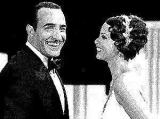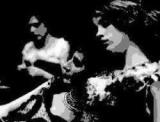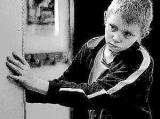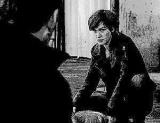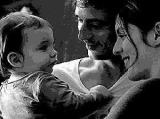1. The Artist
There is a certain irony in the fact that the most talked about French film of 2011 is a silent movie and was made, not in France, but in Hollywood. Be that as it may, The Artist provided a welcome shot in the arm for French cinema and introduced a whole new generation of moviegoers to the magic of silent film. The team that brought us the recent OSS spy capers, director Michel Hazanavicius and actor Jean Dujardin, notched up a comparable success with what is probably the most daring film of the year, certainly one of the snazziest. The Artist is not just a tribute to the great era of silent cinema, it is also an astute study in the transience of fame, sometimes funny, sometimes exquisitely poignant. The star of the film proved to be an eight-year-old Jack Russell named Uggie, who was given a special award at the 2011 Cannes Film Festival. Among the numerous awards that came the film's way were five Oscars (including the award for Best Picture), seven BAFTAs and six Césars. There's some truth in that old saying: silence is golden.Read full review...
2. L'Apollonide (Souvenirs de la maison close) (House of Tolerance)
Inspired by a notorious painting by Gustave Courbet, L'Apollonide (Souvenirs de la maison close) presents a starkly sensual portrayal of life in a Parisian brothel of the mid-19th century. Directed by Bertrand Bonello, a filmmaker renowned for his daringly bleak explorations of sexuality, the film is a lurid and poetic expression of women's eternal quest for freedom and independence in a male-dominated world. Drawing on the brazenly erotic French paintings of the 19th century, Bonello's seductive masterpiece suggests a world of untrammelled beauty which is cruelly disfigured by man's bestial nature.Read full review...
3. Le Gamin au vélo (The Kid with a Bike)
Jean-Pierre and Luc Dardenne's latest film is much gentler in tone than their previous naturalistic dramas, but that doesn't mean it isn't any less profound and authentic. Le Gamin au vélo offers an intensely true-to-life account of adolescent rebellion and feels like a modern-day reinterpretation of Truffaut's Les 400 coups. The film isn't just about an adolescent's search for adult acceptance, it also explores the need that grown-ups have to form emotional bonds with children. Thanks to a captivating central performance from 11-year-old Thomas Doret, this is easily one of the Dardenne brothers' most engaging films.Read full review...
4. Angèle et Tony (Angèle and Tony)
In her remarkable debut feature, director Alix Delaporte crafts a romantic drama of immense warmth and vitality which bears comparison with Robert Guédiguian's similar Marius et Jeannette. Set against an austere backdrop of industrial decline in the town of Calvados, Angèle et Tony presents an unlikely romance between two seemingly ill-matched people played with extraordinary conviction by Clotilde Hesme and Grégory Gadebois. The fierce brutality of the world that Angèle and Tony inhabit renders their romance all the more magical and makes you realise how much we have to be grateful for, even when the world economy is going down the tubes.Read full review...
5. La Guerre est déclarée (Declaration of War)
With its moving account of a young couple battling to save the life of their toddler after he has been diagnosed with cancer, La Guerre est déclarée is one of the most audacious, and also one of the most uplifting, French films of 2011. Drawing heavily on their own traumatic experiences, Valérie Donzelli and Jérémie Elkaïm pool their resources to give us a bittersweet film that is breathtaking in its vitality and originality, one of the most life-affirming French films in years. With its casual nods to Jacques Demy and François Truffaut, the film is as vibrant and stylish as it is poignant, but it is the authenticity that Donzelli and Elkaïm bring to their performances which makes it particularly special.Read full review...
6. La Fée (The Fairy)
After L'Iceberg and Rumba, the incomparable trio that is Dominique Abel, Fiona Gordon and Bruno Romy returns with another generous helping of carefree slapstick effortlessly fashioned into a modern fable. The team's unique brand of poetic farce owes much to Charlie Chaplin and Buster Keaton, but the charm they bring to their films is entirely their own. Set in the gloomy port of Le Havre, La Fée has a more social realist edge than the trio's previous films and doesn't shirk from showing the darker side of contemporary life - homelessness, illegal immigrants and mental illness. Yet whilst misery abounds, there is also love and romance - life is, after all, a fairy tale...Read full review...
7. Les Neiges du Kilimandjaro (The Snows of Kilimanjaro)
Inspired by a poem by Victor Hugo, Robert Guédiguian's latest film is a heartfelt expression of the futility of trying to seek Utopia in this world. The drama revolves around two characters (played by Guédiguian regulars Ariane Ascaride and Jean-Pierre Darroussin) who, now living in comfortable retirement, begin to question what they have achieved through their lifelong commitment to socialism. Workers are no better off today than they were decades ago; indeed for many life is even more precarious. Like the doomed hero in Hemingway's famous short story which gives the film its title, we are left wondering whether socialists have been pursuing the right dream, or merely chasing an empty illusion that leads to nothing.Read full review...
8. Intouchables
The Artist may have had the greatest impact outside France (and taken most of the prizes), but the French film that drew the largest audience at home was Intouchables, which sold 19.4 million cinema tickets and now ranks as the second most popular French film in history (after Dany Boon's 2008 film Bienvenue chez les Ch'tis). Inspired by a real-life story, the writer-director team Olivier Nakache and Eric Toledano deliver a boisterous, politically incorrect comedy about a tetraplegic man recovering his zest for life through his friendship with a streetwise carer. François Cluzet and Omar Sy form one of the most memorable double acts in French cinema and make this a marvellously warm and funny culture-clash comedy. Beneath the comic hi-jinks there is a deeper meaning to this film, an appeal to see beyond our prejudices and treat others with more tolerance and compassion.Read full review...
9. Tomboy
Céline Sciamma's follow up to her acclaimed debut feature Naissance des pieuvres is a similarly honest examination of sexual identity, one that tackles the controversial subject of lesbian awakening with gratifying sensitivity and charm. Despite the film's provocative themes, Tomboy can hardly fail to enchant with its sincerity and warmth, adopting a child's eye view of the world that gives it an astonishing immediacy. Captivating performances from Zoé Héran and Jeanne Disson make this a compelling naturalistic drama that is as cruel as it is poignant.Read full review...
10. Le Havre
Winner of the prestigious Louis Delluc prize, Le Havre somehow manages to combine the distinctive styles of Jean-Pierre Melville, Robert Bresson and Jacques Tati to deliver a film that is truly a one-off - an immigration-themed social comedy with circa 1970s policier undertones. Acclaimed Finnish filmmaker Aki Kaurismäki also takes time out to pay homage to the films of Marcel Carné and Jean Renoir as he lambastes communities and governments for failing to deal effectively with the human consequences of illegal immigration. It sounds improbable but the film manages to marry the cold film noir aesthetic with Chaplinesque farce whilst offering a scathing but humorous social commentary on our socially fragmented era.Read full review...
